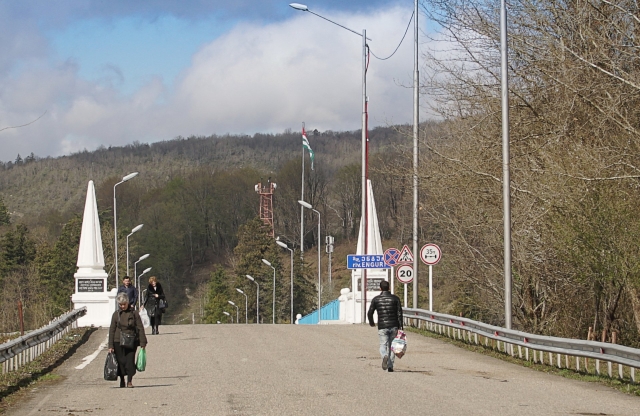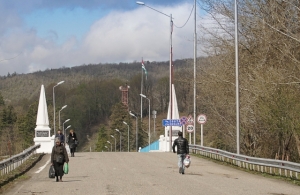Georgians Protest in Gali, Abkhazia
Late last week, groups of local residents of the Gali district of Abkhazia, mostly populated by ethnic Georgians, protested the closing of the so-called border.
Starting from January 10, the de facto Abkhaz government restricted crossing the administrative boundary line into Tbilisi-controlled territory for two months, due, they said, to fears of swine flu spreading.
On January 23, approximately 80 people took to the streets in Gali. "The main reasons for outrage are the closure of the border due to quarantine, the impossibility of crossing the border to Georgia, and the issue of residents' passports, as since January 1, the 2005 passport of an Abkhazia citizen ceased to be valid," said Timur Nadaraya, the de-facto head of the Gali District, according to "apsadgil.info." Gali residents frequently cross into Tbilisi-controlled territory south of the boundary line for work, education, medical services, to collect government social benefits, and to buy and sell products. Current crossing is restricted to workers at the Enguri hydropower plant and patients with serious medical conditions who are being treated in other parts of Georgia.
Yesterday afternoon, opposition politician Nino Burjanadze spoke to reporters, saying "Nobody thinks about Abkhazia or Samachablo...If the government cannot take care of Georgians in Gali, how will they persuade Abkhazians and Ossetians that they will take care of them?" She called on the government of Georgia to take immediate action to help the Georgian citizens in Abkhazia. She criticized the de-facto Abkhaz government, accusing them of lying about the reason for the "border" crossing. It is not about swine flu, says Burjanadze, but the policy of forced passportization.
"Georgians still living in Abkhazia held a protest rally in Gali and demanded opening of the Enguri Bridge from the Abkhazian administration. This information was hidden by the Georgian authorities" accused Burjanadze.
Concerns have also been raised over Georgia's policy in Abkhazia to allow Abkhaz students to take the national exams in their native language (presumably Abkhazian), which does not benefit the ethnic Georgians in the area, who, since 2016 have been prohibited from studying in their native Georgian, and whose Abkhaz is generally not at the level of a native speakers. At the same time, the announcement came yesterday that national exams for graduating high school students will be abolished altogether in 2020.
By Samantha Guthrie
Photo: Hromadske.ua












